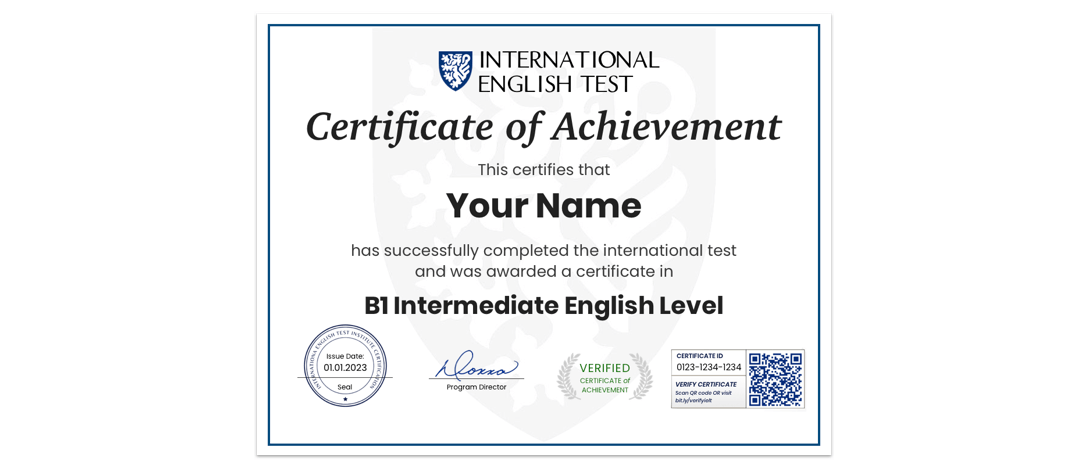B1 English Test
The B1 English test refers to an English language proficiency exam designed to assess an individual’s competence at the B1 level on the Common European Framework of Reference for Languages (CEFR). The B1 level signifies an intermediate level of language proficiency.
The B1 English test evaluates a candidate’s ability to understand and use familiar everyday expressions, interact in common situations, and engage in basic communication tasks. It assesses skills in areas such as reading, writing, listening, and speaking, and typically covers topics relevant to daily life, work, and personal interests.
B1 Level English
B1 level English refers to an intermediate level of language proficiency on the Common European Framework of Reference for Languages (CEFR). At the B1 level, individuals have developed a foundation in the English language and can effectively communicate in various everyday situations.
Here are some key characteristics of B1 level English:
- Reading: Can understand the main points of familiar texts, such as newspaper articles or simple fiction, and extract relevant information.
- Writing: Can produce simple, coherent texts on familiar topics, express opinions, and provide basic explanations or descriptions.
- Listening: Can understand the main ideas of conversations, radio broadcasts, or speeches on familiar topics, provided that the speech is clear and relatively slow.
- Speaking: Can engage in conversations on familiar topics, express personal preferences, give basic descriptions, and participate in simple discussions.
- Vocabulary and Grammar: Possesses a range of vocabulary and basic grammatical structures to communicate about personal experiences, daily routines, and common activities.
B1 English
Achieving a successful score on the B1 English demonstrates that the candidate has reached a level of English proficiency that allows for effective communication in various practical contexts. It may be required for certain educational programs, job applications, or visa requirements.
Intermediate English
At the intermediate level, individuals can comprehend and express themselves in a range of familiar everyday situations. They possess a solid understanding of basic grammar and vocabulary, allowing them to form coherent sentences and convey their ideas with relative ease.
Intermediate Level
The intermediate level refers to a stage of language proficiency that falls between the beginner level and the advanced level. It signifies a significant progression in language learning and indicates a solid foundation in the target language.
At the intermediate level, individuals can understand and communicate in a variety of everyday situations with relative ease. They possess a sufficient grasp of grammar and vocabulary to engage in conversations, express opinions, and understand basic written texts.
Pre intermediate
Pre-intermediate refers to a level of language proficiency that comes before the intermediate level. It represents a stage in language learning where individuals have moved beyond the beginner level but are not yet considered fully intermediate.
At the pre-intermediate level, individuals have acquired foundational knowledge of the language and are able to engage in basic communication in simple, familiar situations. They are developing their language skills and expanding their vocabulary and grammar knowledge.
FAQ
1. What is Intermediate English?
Intermediate English refers to a level of language proficiency that falls between beginner and advanced levels. It signifies a solid foundation in the English language and the ability to communicate in various everyday situations.
2. How can I improve my Intermediate English skills?
To enhance your Intermediate English skills, it is recommended to engage in regular conversation practice, read English texts of varying difficulty, watch movies or TV shows in English, and utilize online resources and language learning platforms.
3. What are the key characteristics of Intermediate English?
Intermediate English involves the ability to understand and express oneself in a range of everyday situations, possessing a solid grasp of basic grammar and vocabulary, and being able to engage in conversations, write simple texts, and comprehend straightforward written and spoken materials.
4. Is Intermediate English sufficient for professional contexts?
While Intermediate English allows for basic communication, it is advisable to continue developing your language skills to reach an advanced level for professional contexts. Building vocabulary, refining grammar, and practicing specialized language relevant to your field can help you excel in professional settings.
5. How long does it take to reach Intermediate English proficiency?
The time required to reach Intermediate English proficiency varies depending on several factors, such as prior language learning experience, amount of practice, and individual aptitude. Consistent effort and dedicated practice can expedite the learning process.
6. Can I travel to English-speaking countries with Intermediate English?
Yes, having Intermediate English proficiency enables you to navigate basic interactions during travel, such as ordering food, asking for directions, and engaging in simple conversations with locals.
7. How can I measure my Intermediate English level?
Assessments such as standardized tests like the B1 Preliminary or the IELTS (International English Language Testing System) can help determine your current level of Intermediate English proficiency.
8. Are there online resources to practice Intermediate English?
Yes, there are numerous online resources, including language learning websites, mobile applications, and interactive exercises, that offer targeted practice for Intermediate English skills.
9. Can Intermediate English be a stepping stone for advanced proficiency?
Absolutely! Building upon your Intermediate English skills through continued practice, exposure to authentic materials, and advanced language courses can pave the way for reaching higher levels of language proficiency.
10. How can Intermediate English benefit my personal and professional life?
Intermediate English proficiency expands your opportunities for international communication, boosts confidence in English-speaking environments, facilitates cultural understanding, and improves prospects for education and career advancement.
Remember, Intermediate English is a significant milestone on your language learning journey. With consistent effort and practice, you can continue to progress and unlock even greater fluency and confidence in the English language.

